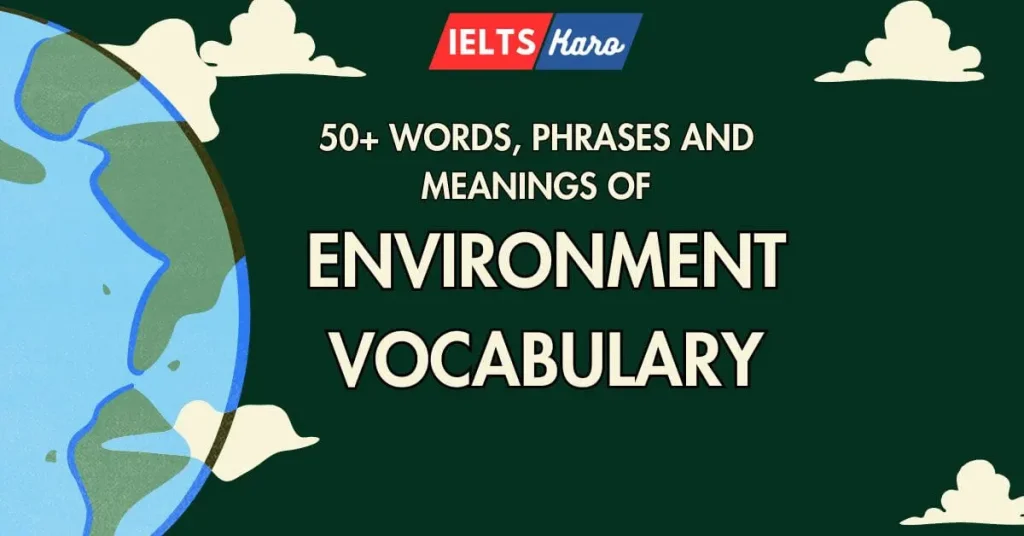Here are 50+ Words to boost your Environment Vocabulary for IELTS
Over the last few years, topics in Writing, Speaking and Reading, relevant to environment have increased. This means, now is the best time to learn new words, phrases, definitions and examples for environment vocabulary.
Words with Meanings – Definition and Examples
World Population
Overpopulation: A condition in which an area, city or a country has more people than its capacity, making the population so dense that it causes environmental deterioration, an impaired quality of life, or a population crash.
- Example: “Overpopulation in urban areas leads to increased demand for housing and resources, resulting in environmental degradation.”
Carrying capacity: The maximum population size of a species that an environment can sustain indefinitely.
- Example: “The carrying capacity of many regions is being tested as resources become scarce.”
Population density: The number of people living per unit of area.
- Example: “High population density in cities contributes to various environmental issues, including air and water pollution.”
Marine Pollution
Eutrophication: The process by which a body of water becomes enriched with nutrients, leading to excessive growth of algae and depletion of oxygen.
- Example: “Eutrophication caused by agricultural runoff has severely impacted marine ecosystems.”
Microplastics: Tiny plastic particles that pollute the environment, particularly the oceans.
- Example: “Microplastics are ingested by marine life, causing health problems and entering the human food chain.”
Oil spill: The release of liquid petroleum into the environment, especially marine areas, due to human activity.
- Example: “The oil spill had devastating effects on marine life, contaminating water and coastlines.”
Air Pollution
Smog: A type of air pollution caused by the interaction of sunlight with pollutants produced by vehicle emissions and industrial processes.
- Example: “The city was covered in smog, causing respiratory problems for its inhabitants.”
Particulate matter (PM): A mixture of tiny particles and droplets in the air that can be harmful to health.
- Example: “Particulate matter from factories and vehicles contributes significantly to air pollution.”
Acid rain: Precipitation that contains high levels of sulfuric or nitric acids, resulting from the burning of fossil fuels.
- Example: “Acid rain damages forests and aquatic ecosystems, and corrodes buildings and monuments.”
Climate Change
Greenhouse gases (GHGs): Gases that trap heat in the atmosphere, contributing to global warming.
- Example: “Carbon dioxide and methane are two significant greenhouse gases responsible for climate change.”
Global warming: The long-term rise in the average temperature of the Earth’s climate system.
- Example: “Global warming is leading to melting ice caps and rising sea levels.”
Carbon footprint: The total amount of greenhouse gases produced directly and indirectly by human activities.
- Example: “Reducing one’s carbon footprint can help mitigate the effects of climate change.”
Land Degradation
Deforestation: The clearing or thinning of forests by humans.
- Example: “Deforestation contributes to habitat loss and soil erosion.”
Desertification: The process by which fertile land becomes desert, typically as a result of drought, deforestation, or inappropriate agriculture.
- Example: “Desertification threatens the livelihoods of millions of people living in arid regions.”
Soil erosion: The wearing away of the topsoil layer, which is essential for plant growth and agriculture.
- Example: “Soil erosion reduces agricultural productivity and can lead to food insecurity.”
Biodiversity
Biodiversity: The variety of life in the world or in a particular habitat or ecosystem.
- Example: “Protecting biodiversity is crucial for maintaining ecosystem balance and resilience.”
Endangered species: Species that are at risk of extinction due to habitat loss, hunting, or other factors.
- Example: “Conservation efforts are essential to protect endangered species from extinction.”
Habitat fragmentation: The process by which a large, continuous area of habitat is broken into smaller, isolated sections.
- Example: “Habitat fragmentation can lead to reduced biodiversity and increased human-wildlife conflicts.”
Renewable Energy
Renewable energy: Energy from natural sources that are replenished constantly, such as solar, wind, and hydro power.
- Example: “Investing in renewable energy is key to reducing dependence on fossil fuels and combating climate change.”
Sustainable development: Development that meets the needs of the present without compromising the ability of future generations to meet their own needs.
- Example: “Sustainable development practices are essential for preserving environmental resources.”
Energy efficiency: Using less energy to perform the same task, thereby reducing energy waste.
- Example: “Improving energy efficiency in homes and businesses can significantly reduce greenhouse gas emissions.”
Waste Management
Recycling: The process of converting waste materials into new materials and objects.
- Example: “Recycling helps reduce the amount of waste sent to landfills and conserves natural resources.”
Composting: The process of recycling organic waste, such as food scraps and yard waste, into a valuable fertilizer.
- Example: “Composting organic waste reduces landfill usage and enriches soil health.”
Landfill: A site for the disposal of waste materials by burial.
- Example: “Modern landfills are designed to minimize environmental impact, but recycling is still a better option.”
Tips for Using Environment Vocabulary in IELTS:
1. Learn Common Environmental Terms
- Pollution: air pollution, water pollution, noise pollution
- Conservation: conservation efforts, wildlife conservation, natural resources
- Sustainability: sustainable development, renewable energy, green technology
- Climate Change: global warming, greenhouse gases, carbon footprint
- Ecosystems: biodiversity, habitats, deforestation, reforestation
2. Use Flashcards
Create flashcards with key environmental terms and their definitions. Review these regularly to reinforce your memory.
3. Read Articles and Reports
Read articles, reports, and journals related to the environment. Websites like National Geographic, BBC Environment, and scientific journals are good sources. Take note of new vocabulary and their context.
4. Watch Documentaries and Videos
Watch documentaries on environmental topics. This will help you understand how terms are used in context and improve your listening skills. Examples include “Our Planet” on Netflix and “Before the Flood” by National Geographic.
5. Practice with IELTS Materials
Use IELTS practice books and online resources that focus on the environment. Practice reading passages, listening exercises, and speaking topics related to the environment.
6. Write Essays
Write essays on environmental topics. This practice helps in organising your thoughts and using relevant vocabulary effectively. You can also get feedback from teachers or peers.
7. Mind Mapping
Create mind maps linking various environmental terms and concepts. This visual representation helps in better retention and understanding of how terms are interrelated.
8. Stay Updated with Current Events
Follow news related to environmental issues. Understanding current events will help you discuss recent developments and use contemporary vocabulary during the speaking test.
Example Questions and Responses – Speaking Part 1
Do you think that population is a big problem nowadays?
Overpopulation is indeed a big issue. When there is a lack of proper strategy, overpopulation can damage the natural environment, and lead to plastic waste in the oceans.
Are you worried about climate change?
For the last decade, the temperatures during summers have been breaking records each year. This is because of carbon emissions, leading to global warming. It really worries me because in Pakistan, it has resulted in flash floods and other natural disasters.
Do you use renewable energy like wind or solar power?
My country Pakistan is blessed with abundant sunlight. And just recently we installed solar panels at our rooftop, which has reduced our utility bills, and provided us with constant power day and night.
What do you do to prevent the environment from pollution?
I always play my part by not littering on the streets and roads. I always dispose off garbage in trash cans to save our environment.
Example Questions and Responses – Speaking Part 2
Describe an environmental problem you’ve heard about.
You should say:
- What it is?
- How long has it existed?
- How has it impacted people’s lives?
Pakistan is blessed with abundant natural resources, such as sunlight, wind, and trees. Despite this, there are many environmental problems with my country, and one that I’d like to highlight is the rapid deforestation.
To accommodate for an ever increasing population in the urban areas, trees have rapidly been cut down, in my city, Lahore. What once used to be a city filled with lush green gardens and tall trees, has started becoming a barren land.
Trees are cut down and hundreds of acres of land has been bulldozed to build housing societies. Due to lack of trees, the overall temperature in Lahore has also been increasing every year, as a result of deforestation and urbanization.
Other than the heat, there have been two ways that people have been severely affected. First, the water level beneath the ground has been going down, making it harder each year to extract fresh water. Second, due to excessive heat, air conditioning equipment are used frequently, resulting in high power and utility bills.
In other countries, there are rules and regulations on the amount of trees that can be cut in a year, and I am glad to see that European and Western countries are enforcing laws to protect the natural habitat and the environment.
Conclusion:
Environmental problems are far too many in the world to focus on. This means that there are good chances you may get a question relevant to environment. Having sound knowledge of its vocabulary is vital to score a high band score in your IELTS exam.





